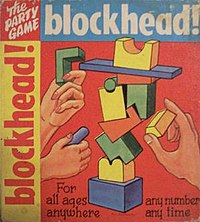
Scrabble is a word game in which two to four players score points by placing tiles, each bearing a single letter, onto a game board divided into a 15×15 grid of squares. The tiles must form words that, in crossword fashion, read left to right in rows or downward in columns and are included in a standard dictionary or lexicon.
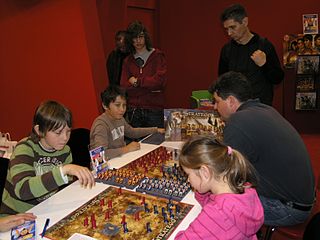
Stratego is a strategy board game for two players on a board of 10×10 squares. Each player controls 40 pieces representing individual officer and soldier ranks in an army. The pieces have Napoleonic insignia. The objective of the game is to either find and capture the opponent's Flag or to capture so many enemy pieces that the opponent cannot make any further moves. Stratego has simple enough rules for young children to play but a depth of strategy that is also appealing to adults. The game is a slightly modified copy of an early 20th century French game named L'Attaque. It has been in production in Europe since World War II and the United States since 1961. There are now two- and four-player versions, versions with 10, 30 or 40 pieces per player, and boards with smaller sizes. There are also variant pieces and different rulesets.
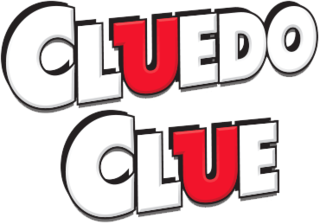
Cluedo, known as Clue in North America, is a murder mystery game for three to six players that was devised in 1943 by British board game designer Anthony E. Pratt. The game was first manufactured by Waddingtons in the United Kingdom in 1949. Since then, it has been relaunched and updated several times, and it is currently owned and published by the American game and toy company Hasbro.

Checkers, also known as draughts, is a group of strategy board games for two players which involve diagonal moves of uniform game pieces and mandatory captures by jumping over opponent pieces. Checkers is developed from alquerque. The term "checkers" derives from the checkered board which the game is played on, whereas "draughts" derives from the verb "to draw" or "to move".

Jenga is a game of physical skill created by British board game designer and author Leslie Scott and marketed by Hasbro. Players take turns removing one block at a time from a tower constructed of 54 blocks. Each block removed is then placed on top of the tower, creating a progressively more unstable structure.

Sorry! is a board game that is based on the ancient Indian cross and circle game Pachisi. Players move their three or four pieces around the board, attempting to get all of their pieces "home" before any other player. Originally manufactured by W.H. Storey & Co in England and now by Hasbro, Sorry! is marketed for two to four players, ages 6 and up. The game title comes from the many ways in which a player can negate the progress of another, while issuing an apologetic "Sorry!"
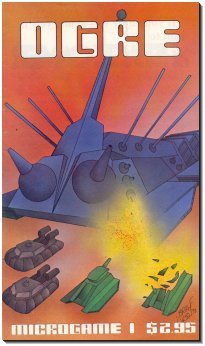
OGRE is a science fiction board wargame designed by the American game designer Steve Jackson and published by Metagaming Concepts in 1977 as the first microgame in its MicroGame line. When Steve Jackson left Metagaming to form his own company, he took the rights to OGRE with him, and all subsequent editions have been produced by Steve Jackson Games (SJG).
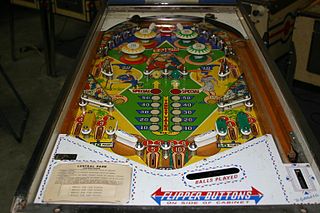
Gottlieb was an American arcade game corporation based in Chicago, Illinois. It is best known for creating a vast line of pinball machines and arcade games throughout much of the 20th century.

Cosmic Encounter is a science fiction–themed strategy board game designed by "Future Pastimes" and originally published by Eon Games in 1977. In it, each player takes the role of a particular alien species, each with a unique power to bend or break one of the rules of the game, trying to establish control over the universe. The game was inducted into the Academy of Adventure Gaming Arts & Design Adventure Gaming Hall of Fame in 1997.
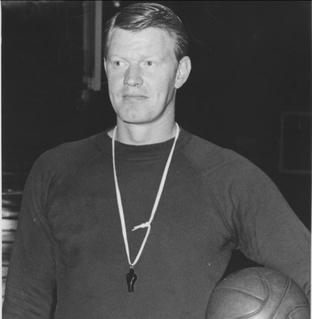
John Graham "Red" Kerr was an American basketball player, coach, and color commentator. He played in the NBA from 1954 to 1966, mainly as a member of the Syracuse Nationals. He later held several coaching and administrative positions before embarking on a thirty-three-year career as a television color commentator for the Chicago Bulls.
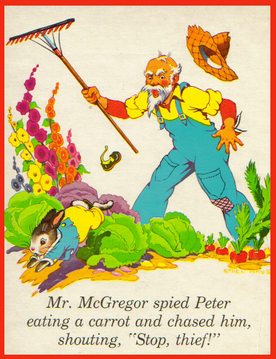
The Saalfield Publishing Company published children's books and other products from 1900 to 1977. It was once one of the largest publishers of children's materials in the world.
The 1954 Baltimore Orioles season saw the restoration of Major League Baseball to Baltimore after a 51-year absence, and the debut of the modern edition of the MLB Oriole franchise. Upon the transfer of the moribund St. Louis Browns on September 30, 1953, Baltimore returned to the American League over a half century after the Orioles of 1901–02 departed for New York City, where they eventually became the Yankees. The Baltimore Terrapins of the "outlaw" Federal League filled the void in 1914 and 1915, but the insurgent circuit collapsed without gaining recognition as a "third major league," and, as of 2022, its status remained in dispute. During most of its 51 seasons without a major-league team, Baltimore was represented in Organized Baseball by a top-level minor-league club, the Orioles of the International League.

Pressman Toy Corporation is a toy manufacturer based in Richardson, Texas. Founded in 1922 by Jack Pressman, it currently focuses on family games and licensed products.
The 1980 Philadelphia Phillies season was the team's 98th season in Major League Baseball (MLB) and culminated with the Phillies winning the World Series at home by defeating the Kansas City Royals in Game 6 on Oct. 21, 1980.
The 1969 Seattle Pilots season was the only season of the Seattle Pilots, a Major League Baseball team. As an expansion team in the American League, along with the Kansas City Royals, the Pilots were placed in the newly established West division. They finished last among the six teams with a record of 64–98 (.395), 33 games behind the division champion Minnesota Twins.

Russian draughts is a variant of draughts (checkers) played in Russia and some parts of the former USSR, as well as parts of Eastern Europe and Israel.

This page details the all-time statistics, records, and other achievements pertaining to the Los Angeles Lakers. The Los Angeles Lakers are an American professional basketball team currently playing in the National Basketball Association.

Speed Circuit is a Formula I racing game published by 3M in 1971, and then republished by Avalon Hill in 1977.
This glossary of board games explains commonly used terms in board games, in alphabetical order. For a list of board games, see List of board games; for terms specific to chess, see Glossary of chess; for terms specific to chess problems, see Glossary of chess problems.

